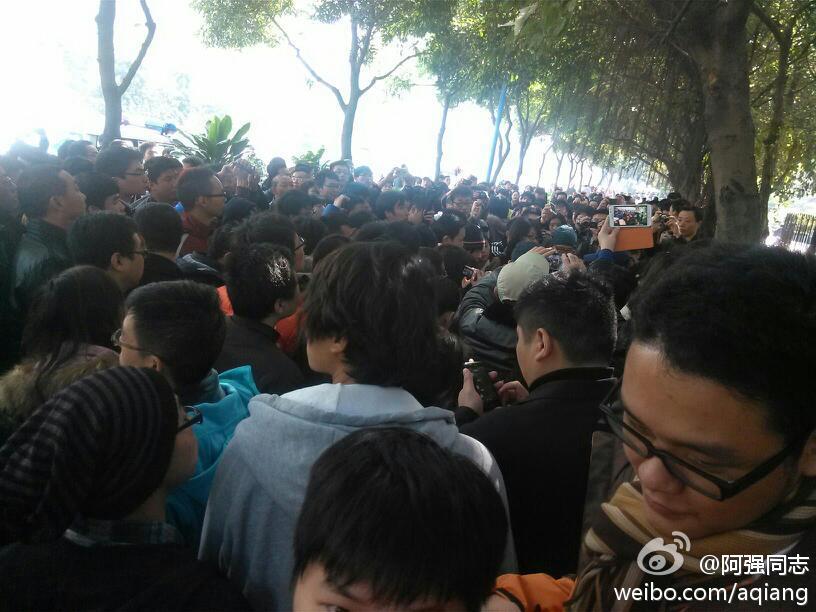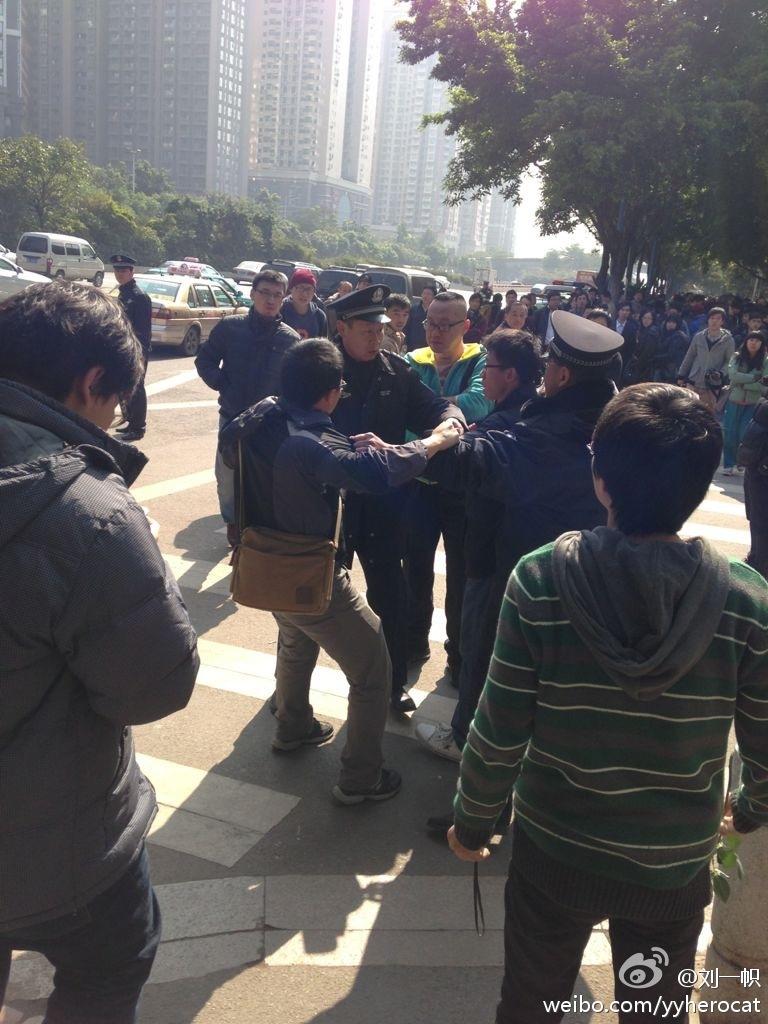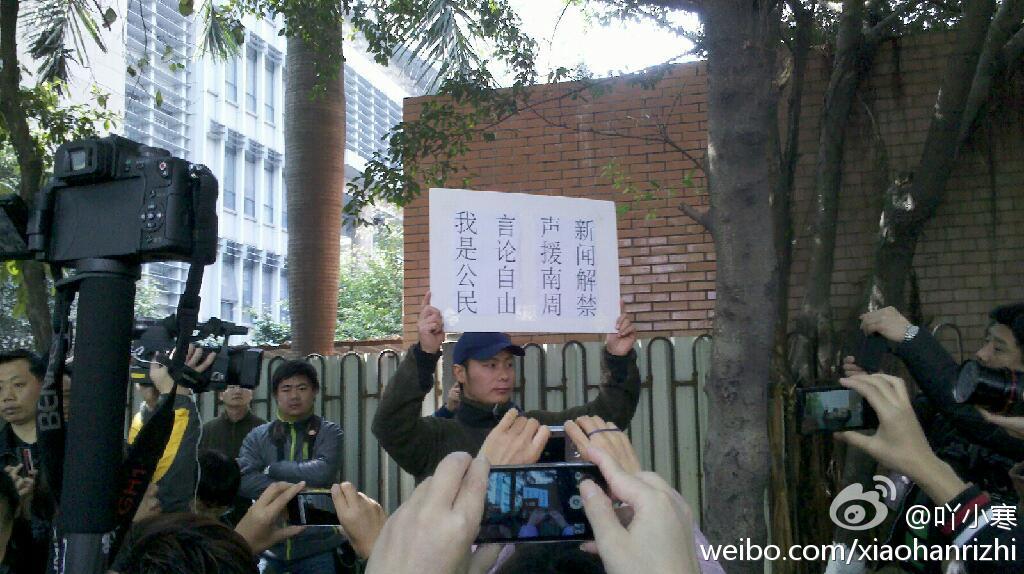An internal standoff has escalated into a full-blown crisis at Southern Weekly (formerly known as Southern Weekend), where Guangdong’s propaganda chief meddled in the publication’s annual “New Year’s Greeting” last week and prompted calls for his resignation. The South China Morning Post reported today that the tussle has taken to the microblogosphere and Southern Weekly’s editorial staff have decided to strike:
It is the first time in more than two decades that the editorial staff of a major newspaper has openly staged a strike against government censorship.
The decision was made after the newspaper management took over the department’s official microblog account, and issued a statement claiming that a controversial front-page New Year editorial had been written by its staff and was not a last-minute alteration by Guangdong propaganda officials. The management also blamed a blunder in the article on an editor.
The staff later issued a statement via another microblog denying the management’s account and announced a strike. Unlike two previous open letters issued by the department, last night’s statement was signed.
“The statement [on the official microblog] does not represent the opinion of the editorial staff. It is a result of pressure applied by the authorities on the … management,” the department said. “The editorial staff will fight against the falsified statement … Until the issue is resolved, we will not do any editorial work.”
Physical or “offline” protests were also scheduled to take place today at Southern Weekly’s offices in Guangzhou and Beijing, according to John Kennedy at the South China Morning Post, who has been posting and tweeting live updates and photos (including the ones below) on the developing situation:
Official statements of protest were issued by students at Sun Yat-sen University in Guangzhou and Nanjing University School of Journalism and Communication. Middle school students were also reportedly joining the protest at the newspaper offices, while popular actress Yao Chen, who has more than 30 million followers on Sina Weibo, posted one sentence in support of Southern Weekly:
Actress Yao Chen quoted Solzhenitsyn—”One word of truth outweighs the whole world”—in support of Southern Weekend – bit.ly/UuzSs5
— Austin Ramzy (@austinramzy) January 7, 2013
Yao Chen’s Southern Weekend message has been re-posted 30,000+ times in the past hour or so on Sina Weibo
— Austin Ramzy (@austinramzy) January 7, 2013
David Bandurski of the China Media Project, who calls the incident “without a doubt one of the most important we will witness in China this year,” details the weekend meetings between Southern Weekly editors and newspaper management which led to the strike:
According to an internal account CMP obtained from a source at the Nanfang Daily Group, which publishes a constellation of top magazines and newspapers, including Southern Weekend and Southern Metropolis Daily, an expanded meeting (编委扩大会议) of the editorial committee at Southern Weekly was held at 7 p.m. on Saturday, January 5. The meeting was voluntarily attended by many members of the paper’s editorial staff.
At the meeting, editorial staff demanded that a special investigative team be appointed to look into the “New Year’s Greeting” incident and produce a report to be issued publicly. Wang Genghui (王更辉), the deputy editor of Nanfang Media, and Huang Can (黄灿), a member of the group’s editorial committee and acting editor-in-chief of Southern Weekly, described to those present how the New Year’s special edition of the newspaper had been “altered in violation of the rules” (违规删改), particularly in the addition of an introduction to the edition. They promised that there would be no settling of scores and that the censorship process would be “returned to normal.”
At the insistence of the editorial staff, Wang Genghui and Huang Can agreed to the immediate formation of an investigative team and said they would relay the staff’s demands to their superiors. The meeting concluded at around midnight.
At around 12:30 a.m. yesterday, January 6, editorial staff learned from reliable sources of an instant message (短信) reportedly ordered by Huang Can and passed on by the paper’s general manager, Mao Zhe (毛哲), ordering that a statement be issued via Southern Weekly‘s official Sina Weibo account. The core content of that message was as follows: “The January 3 New Year’s Message and its introduction in the New Year’s edition of this newspaper were written by editors at the paper to conform to the theme of ‘seeking dreams.’”
The deliberate distortion of the truth in the instant message was a shock to the paper’s editors, especially to those editors who had been responsible for the issue in question.
The New York Times’ Ian Johnson writes that the unrest at Southern Weekly “is posing an early challenge” to new Chinese leader Xi Jinping:
The turmoil at the Guangzhou-based newspaper resonates especially strongly among politically aware Chinese because Mr. Xi chose southern China for a tour after taking power in November. He made a pilgrimage to nearby Shenzhen, where the father of China’s economic reforms, Deng Xiaoping, kick-started them two decades ago.
Indeed, Mr. Xi seems to be casting himself in the mold of Deng, who was known for bold economic reforms but who also brooked no opposition to the rule of the Communist Party.
The latest indication was a speech Mr. Xi made that also was published in newspapers on Sunday. Speaking to senior leaders, Mr. Xi repeatedly invoked Deng, especially on the need to adhere to “socialism with Chinese characteristics,” a phrase often used to mean a combination of pragmatic policies and one-party rule. He also praised the pre-reform era, in what appeared to be an effort to appeal to harder-line Communists.
But part of the reason for the clamor for reforms are hopes that Mr. Xi himself has raised. So far he has won praise by calling for China’s constitutional protections to be put in effect, ordering officials to cut pomp and setting in motion an anticorruption campaign.
Update: John Kennedy of the South China Morning Post, who covered the Southern Weekly story through the evening on Sunday and into Monday as protesters gathered in front of the newspaper’s Guangzhou office, has continued to tweet updates from himself and other netizens:
2:00PM
Southern Weekend supporters picking up scattered chrysanthemum petals. twitter.com/wenyunchao/sta…
— John Kennedy (@28wordslater) January 7, 2013
Large crowd still gathered and things remain peaceful, says one attendee. twitter.com/meowdan/status…
— John Kennedy (@28wordslater) January 7, 2013
1:30PM
Tianya.cn’s Liang Shuxin: Quite a few police/undercovers/guards at the scene now, flowers have all been confiscated, starting to get tense.
— John Kennedy (@28wordslater) January 7, 2013
The Sydney Morning Herald’s John Garnaut has more on the implications of the walkout on Xi Jinping’s agenda:
It poses an early test of China’s direction under the new leadership of Xi Jinping, who has made strong and seemingly contradictory calls for the country to press forward with reform while also returning to the revolutionary legacy of its Maoist past.
“Everybody knows that the system stands naked and that the system is aware that the public knows that it is naked,” said political commentator Zhang Lifan, who is close to several liberal-leaning “princeling” children of revolutionary leaders.
“The question is whether it wants to put on clothes, or not,” he said.
Read more about Southern Weekly and press freedom in China via CDT.










